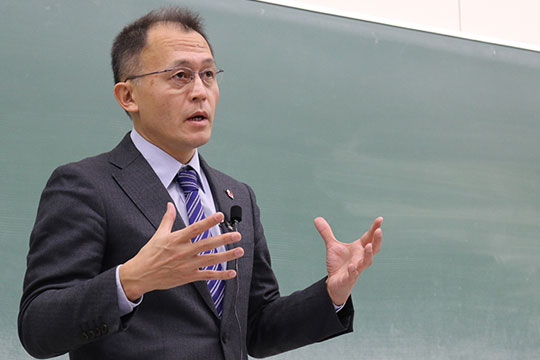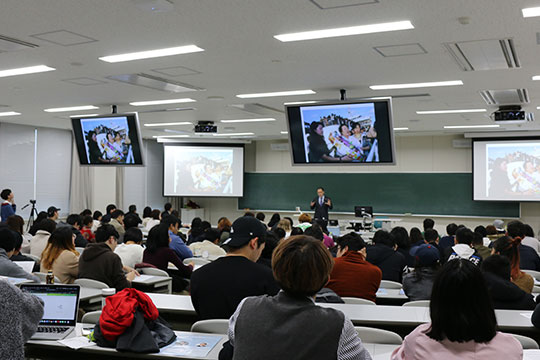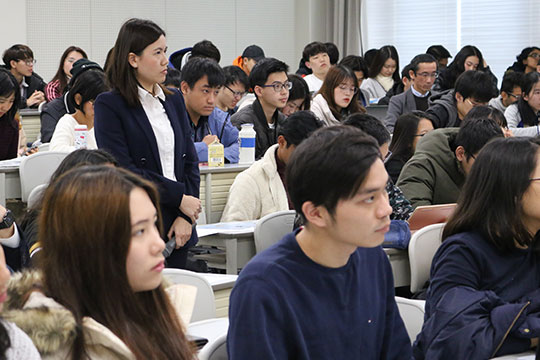On Monday, December 2, Mr. Akira Kawasaki, a member of the International Steering Group of the International Campaign to Abolish Nuclear Weapons (ICAN) and a member of Peace Boat Executive Committee, was invited to the APU campus for the “Lecture Meeting about Leadership: Special Lectures for Peace ” as part of the university’s 20th anniversary commemorative project. The session was sponsored by the APU Peace Marketing Group, led by College of International Management Professor Seiichi Fujii and the Center for Inclusive Leadership*.
Around 150 participants packed the lecture hall to hear Mr. Kawasaki give a talk entitled “Abolishing Nuclear Weapons and Creating Peace Around the World.” He spent the first half of the talk introducing the activities of Peace Boat, where he serves as a member of the Executive Committee. He referred to the Peace Boat as a “village of peace afloat on the sea” and explained how, over the years, it has provided numerous people with a chance to learn and think about the world’s various wars and disputes. He said one of these opportunities came in the form of the history textbook issue, and expressed the importance of deepening mutual ties among people from different countries and regions to avoid disputes arising from differing views of history. In the second half of this lecture, he talked about the activities of ICAN, which won the Nobel Peace Prize in 2017. He explained how ICAN, which is a federation of NGOs from around the world, undertakes a range of activities aimed at abolishing nuclear weapons, including speaking at the United Nations. ICAN—which only has a small number of full-time staff at its headquarters in Switzerland—helped secure the passage of the Treaty on the Prohibition of Nuclear Weapons, and it is currently working to get more countries to sign the treaty, including Japan and nuclear powers that oppose the treaty. He also explained that the Peace Boat organization is one of the members of the ICAN Steering Committee. It has participated in ICAN activities with its Orizuru Project, in which it invites atomic bomb survivors to travel around the world on the Peace Boat to talk about their experiences.
In the question-and-answer session after the lecture, students peppered Mr. Kawasaki with questions that he took time to answer carefully. He told the students that when you pursue any activity, differences of opinion will arise, so resolving these differences requires a process of open and inclusive leadership.
* The Center for Inclusive Leadership (CIL) is an APU initiative that was selected by MEXT for the FY 2018 Private University Research Branding Project. The CIL undertakes academic research and business practices to cultivate inclusive leaders who can turn diverse values into organizational power. It aims to leverage APU’s unparalleled environment of diversity to develop theories and systems of inclusive leadership and share the knowledge gained in the process with as many people as possible to make the world a better place. For more information on the Center for Inclusive Leadership, please visit https://www.apu.ac.jp/cil/.












